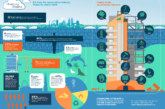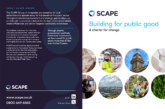Wates Group, the leading privately-owned construction, property services and residential development company, is marking Mental Health Awareness Week with the announcement of a business-wide programme of personal resilience training, aimed at improving colleagues’ wellbeing and helping them to better manage stress.
Beginning in June, and delivered by Wates’ employee mental health partner Everymind at Work, the ‘Bouncing Back’ programme is one element of the Group’s holistic long-term wellbeing plan, which aims to:
- reduce the number of absences due to work related stress
- ensure that all workplaces impact positively on peoples’ wellbeing
- ensure that every employee feels supported to achieve a fair work life balance.
 Kelly Osborne (left), Head of Health and Wellbeing at Wates Group, explained why the programme is so essential: “We care about the health and wellbeing of our people. Ours is an industry with a lifestyle that can be challenging and stressful, with long and demanding hours, and with many often working away from home on site for weeks. The pressures of managing COVID-19 have increased the stress levels and the pressure on our mental health is immense. But even before COVID-19 struck, mental health in our industry was a major concern. Male construction workers are nearly three times more likely than others to take their own life, with one suicide every day. This has been an incredibly tough year for so many of our colleagues, and we want to support everyone, so they feel better equipped to manage setbacks and stress in their lives confidently and effectively, and thereby help protect their mental health.”
Kelly Osborne (left), Head of Health and Wellbeing at Wates Group, explained why the programme is so essential: “We care about the health and wellbeing of our people. Ours is an industry with a lifestyle that can be challenging and stressful, with long and demanding hours, and with many often working away from home on site for weeks. The pressures of managing COVID-19 have increased the stress levels and the pressure on our mental health is immense. But even before COVID-19 struck, mental health in our industry was a major concern. Male construction workers are nearly three times more likely than others to take their own life, with one suicide every day. This has been an incredibly tough year for so many of our colleagues, and we want to support everyone, so they feel better equipped to manage setbacks and stress in their lives confidently and effectively, and thereby help protect their mental health.”
Paul McGregor, Founder of Everymind at Work, said: “Mental health is a real issue within the workplace currently, with businesses still being afraid to tackle it head on in a proactive way and waiting until an issue arises before they do anything about it. Construction is an industry known for its high suicide rates and lack of mental health support, so businesses in this sector need to do more than the ‘norm’. It’s great to see an organisation like Wates taking the mental health of its colleagues seriously. The more businesses can be proactive, offering employees various tools and resources, the quicker they can start to normalise mental health conversations within their workplace.”
The training will provide staff with strategies to improve their personal resilience and help to build a resilience ‘toolkit’ of approaches they can follow to help manage pressures and stress at both work and home.
Comprised of a mixture of in-person or virtual workshops, online learning resources and followed up with a six-week check-in on every participant, the training will allow colleagues to recognise their own stress triggers and cope with stress more effectively; develop a positive mindset that avoids being overwhelmed by issues when they arise; better manage their emotions, and those of people around them and bounce back when times are difficult to deal with the challenges that the workplace can bring.
Paul added: “The workshop is about opening up the conversation around mental health, educating employees on resilience and giving them practical tools to help them deal with difficult situations inside and outside of the workplace. Each employee walks away with his or her own personal resilience toolbox, ready to act on. The follow up session six weeks later is also a great way to encourage them to take action on the training; it’s one thing learning about resilience it’s another thing applying it and these follow up sessions will help them do just that.”
Construction and workplace stress
Anxiety, stress and depression in the industry have been on the increase for several years, with more than 400,000 days of work lost each year because of poor mental health in construction.
A recent survey from the Chartered Institute of Building (2020) found:
- 26% of construction industry professionals had thought about taking their own lives in 2019
- 97% recorded being stressed at least once in the last year. Job insecurity, long hours, time away from families, lack of support from HR and late payments were all contributory factors
- 70% had experienced depression and 87% had experienced anxiety over the past year.









